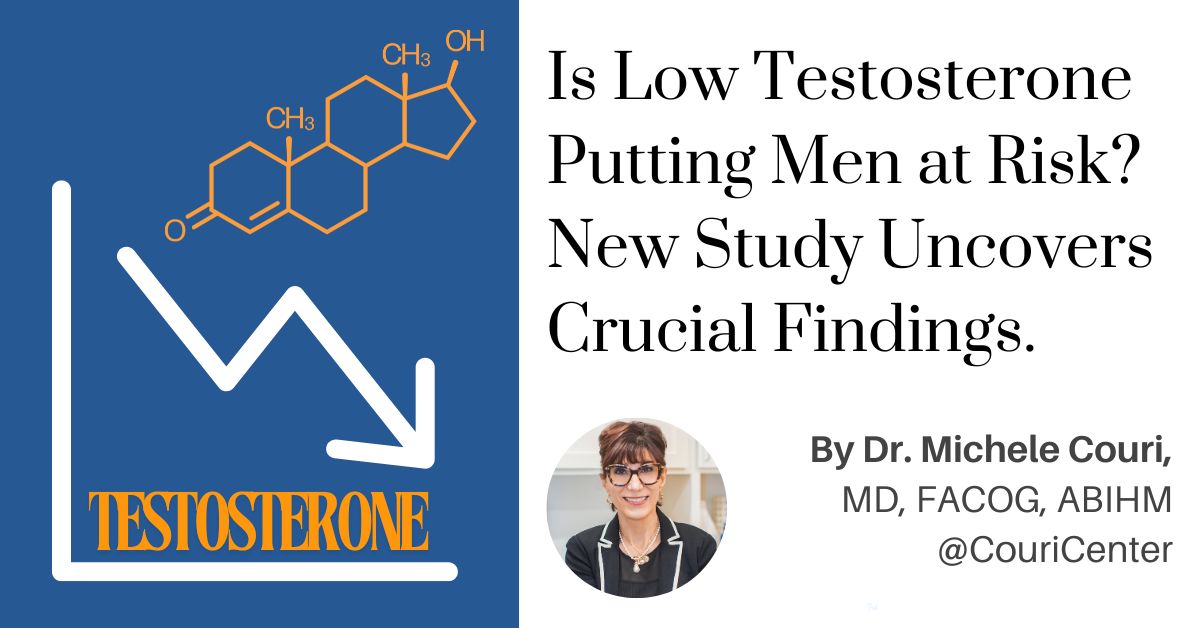
Summary
In her latest blog post, Dr. Michele Couri highlights the crucial role of testosterone in men's health, emphasizing its impact on cardiovascular health, libido, mood, muscle strength, bone density, and cognitive function. Referencing a recent study published in the Annals of Internal Medicine, Dr. Couri explains that low testosterone levels are associated with a significantly increased risk of cardiovascular mortality and all-cause mortality in men. She encourages men to prioritize their hormonal health and check their testosterone levels.
Many of our menopausal-age patients are aware of the importance of maintaining hormonal balance for optimal quality of life, vitality, and health. Does this pertain to the men in our life as well? How important is an optimal testosterone level in men? A recent study shed more light on this topic. “Associations of Testosterone and Related Hormones with All-Cause and Cardiovascular Mortality and Incident Cardiovascular Disease in Men” was published in June in the journal Annals of Internal Medicine. This was a well-done study with the goal of evaluating whether testosterone levels in men were associated with death from any cause or death specifically from heart disease.
What they found is not surprising. Testosterone in men is very important for maintaining optimal health. The researchers found that the lower the testosterone level in men, the greater the risk of death from cardiovascular disease and, actually, an increased risk of all-cause mortality (all causes of death).
- Testosterone levels below 213 ng/dl were linked to an increased all-cause mortality.
- Testosterone levels below 153 ng/dl were associated with higher levels of cardiovascular deaths.
- The degree of the increased risk of these associations was approximately 20%.
To be clear, we cannot make a causal association between low levels of testosterone and mortality, but it very well could be a possibility.
What are the benefits of testosterone besides helping to possibly reduce the risk of death from cardiovascular disease? There are many, and just a few of the most common ones are listed below:
- Increased Libido: One of the primary benefits of testosterone therapy is the improvement in libido and sexual function. Testosterone plays a crucial role in regulating sexual desire, and supplementation can enhance libido in men with low testosterone levels.
- Improved Mood: Testosterone has been linked to mood regulation, and men with low testosterone levels may experience improvements in mood and overall well-being with testosterone therapy. Some studies suggest that testosterone therapy can help alleviate symptoms of depression and anxiety in men with hypogonadism.
- Increased Muscle Mass and Strength: Testosterone is an anabolic hormone that promotes muscle growth and strength. Testosterone therapy can help men increase muscle mass and enhance muscle strength, especially when combined with resistance training.
- Bone Health: Testosterone plays a vital role in maintaining bone density and strength. Testosterone therapy can help prevent bone loss and reduce the risk of osteoporosis in men with low testosterone levels.
- Improved Cognitive Function: Some research suggests that testosterone may play a role in cognitive function, including memory and spatial abilities. Testosterone therapy may improve cognitive function in men with low testosterone levels, although more research is needed in this area.
Checking testosterone levels in men may be the most important indicator of health status. To learn more about testosterone therapy at the Couri Center, please visit our website.
To Your Health,
Dr. Couri
Sources Used:
Yeap, Bu, et al. Associations of Testosterone and Related Hormones with All-Cause and Cardiovascular Mortality and Incident Cardiovascular Disease in Men. Annals of Internal Medicine. Vol 177. No. 6. June 2024; 768-781.
Morgentaler MD, Abraham. t4leducation.com/blog.
DISCLAIMER: The information provided on this website is intended for general informational purposes only and is not intended to be a substitute for professional medical advice, diagnosis, or treatment. The information provided is current as of the date of publication or last review, but medical knowledge is constantly evolving, and the information may become outdated over time.
